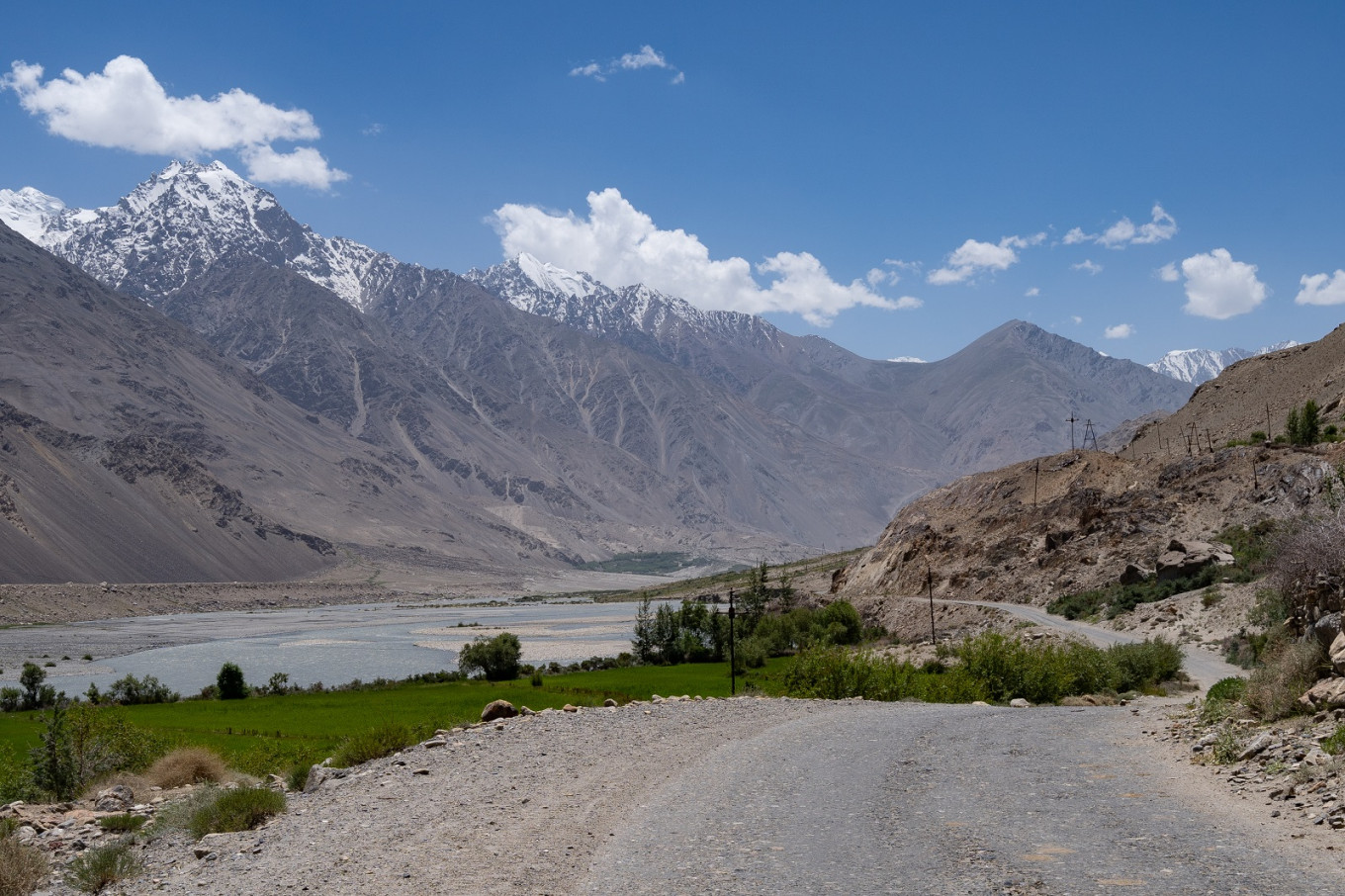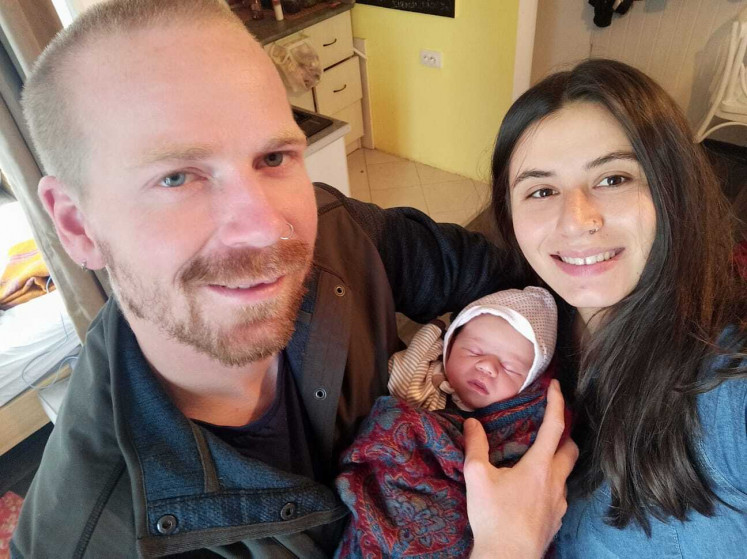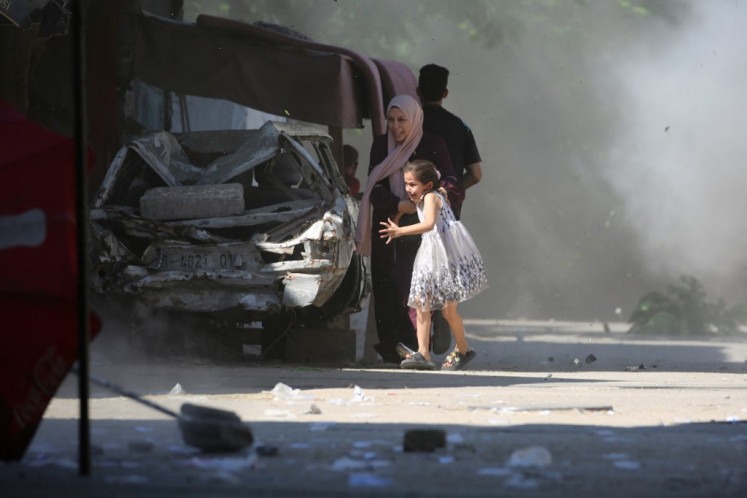Popular Reads
Top Results
Can't find what you're looking for?
View all search resultsPopular Reads
Top Results
Can't find what you're looking for?
View all search resultsA greater adventure: Pandemic traps long-term travelers on an even rougher road
Tens of thousands of globetrotters are spread across the world at any given time; exploring rugged, isolated places far from the typical tourist path. Their passion is connected to moving on when they please. Now they cannot.
Change text size
Gift Premium Articles
to Anyone
I
t was about 8 p.m. at the Azerbaijan-Iran border. Just to the east was the Caspian Sea, to the west, rolling hills of Azerbaijani tea fields.
In their camper van, Duygu Keskin Hatton, seven months pregnant, and her husband, Timothy, were hoping to cross into Azerbaijan toward their destination in Turkey.
As the couple waited in line with hundreds of vehicles, the Azerbaijani border guards were on edge. They took the couple’s temperatures. Duygu’s was normal but Timothy’s fluctuated between 37.1 and 37.6 degrees Celsius.
“Corona, corona, corona!” the guards shouted.
The Hattons would not be crossing the border any time soon. Their years-long sojourn would take an unexpected turn—featuring weeks of enforced confinement, fretful nights filled with worry about the health of their unborn child and, finally, renewed appreciation for the kindness of strangers.
COVID-19 has spread to over 200 countries and territories, locking down travel around the globe. Conventional tourists forced to remain far from home have been able to extend stays in hotels and luxury resorts. Long-term adventure travelers such as the Hattons have landed in much more precarious circumstances.
Roughneck globetrotters are a particular breed: bicycling, hitchhiking, backpacking or driving through entire continents over months or years at a time. Tens of thousands of them are spread across the world at any given time. They explore rugged, isolated places far from the typical tourist path.
Their passion is connected to moving on when they please.
Now they cannot.
Wedded to the road
Born and raised in Germany, Timothy Hatton, 31, started traveling seriously about a decade ago. In 2017, he was in Turkey when he met the woman he would marry just a few months later.
The couple were married in Turkey and lived for a month in the country’s capital of Ankara. They then went to Germany and stayed there for two and a half months. That’s when Timothy bought a 1987 Peugeot J5 camper van for 4,000 euros (US$4,522) and the newlyweds started traveling the world together.
The couple set off on a road trip with no end in sight. They saw Italy, Iraq, Russia, Tajikistan, Pakistan and India. Timothy works remotely as they travel, doing geographic information system (GIS) and translation work online.
Then came pregnancy. The couple was traveling in Kyrgyzstan when they found out Duygu was pregnant.
It was in India, as the couple were still traveling, that they decided to head back to Turkey, Duygu’s home country, so they could be with her family when the baby arrived. They traveled through Pakistan and by early February, into Iran.
COVID-19 was spreading and there were known cases in Iran. The border with Turkey was only five or six days away, so they started driving. Two days from the border, it closed. The couple headed toward Azerbaijan, one of the only adjacent countries to Iran still open.
“We always say, ‘OK things are getting difficult, complicated,’” said Timothy. “But we always say, ‘There is going to be a way.’”
After the Azerbaijani guards detained them at the border, they were whisked away from their van to a hospital. Timothy speaks only German and English and could not communicate with the Azerbaijanis. Duygu speaks English and Turkish, which is similar enough to Azerbaijani that she can communicate.
Once at the hospital, the police took away the couple’s two dogs, Wallace and Sunny Bella, afraid that the animals could also spread the virus. A sympathetic officer promised his wife would look after the dogs.
The couple was shoved into a small room. The bed had no sheets and the toilet was broken. There was no soap. Two nights later, police barged in and forced them onto a packed bus. Besides one Iranian, they appeared to be the only international passengers.
After an hour-long drive, they were corralled into yet another hospital with about 100 others. The locked facility was surrounded by soldiers. Days passed.
A doctor told them there were no coronavirus cases at the hospital and they were not being quarantined.
“If this is not quarantine then it’s a kidnapping, because you have our passports and you don't give us information,” Duygu said.
The doctor turned around and left.
The couple was given mouth swab tests and blood tests but not the standard nasal swab test. Duygu was negative for COVID-19. Timothy tested positive.
They were moved to a third hospital, where a gynecologist told Duygu that the blood tests indicated both mother and baby might not survive if she went into labor.
“Both of us were completely done because we thought maybe we pushed it too much,” Timothy said. “Maybe we put the life of our baby at risk.”
Hours later, workers at the hospital said the results were all a mistake. They had nothing to worry about.
After almost two weeks, Timothy received another test that came back negative for COVID-19.
Read also: ‘We feel very lucky’: Spanish travelers stuck in Bali after transcontinental road trip
Local heroes emerge
After 15 days of being held, they were released. They collected their van and dogs back at the border and made their way to the capital, Baku.
“Now we were dealing with the people,” said Timothy. “In every corner, people are offering help."
Unable to fly because of the late stage of the pregnancy, they reached out to expat communities on Facebook. A local man gave them an apartment and refused to accept payment. Others in the community promised to help take care of the baby. They found a doctor and a hospital.
On April 20, Esme Dem Marian, a baby girl weighing 2.9 kilograms was born.
Timothy and Duygu in Azerbaijan with their newborn baby girl, Esme. (Courtesy of Duygu and Timothy Hatton/File)On May 11, the family finally got plane tickets to Germany and were even able to bring their dogs. After quarantining for two weeks, they moved in with Timothy’s parents.
They’re saving their money and preparing another van for future travels.
A web of support snaps
Long-term adventure travelers rely upon a network of local resources for guides, drivers, tour companies, guest houses and hostels. With travel at a halt, those businesses are hurting.
The Pamir Highway Travel tour company arranges tours, accommodation and guides in Tajikistan, Kyrgyzstan, Uzbekistan and Afghanistan, countries popular for stunning mountain landscapes and challenging high-altitude routes. Travelers contract the Tajikistan-based company for a variety of services, from organizing reliable guides and accommodation to yak safaris and mountain treks. A 16-day tour from Kyrgyzstan to Tajikistan costs $5,347 for four people.
Sherali Bakhtaliev, director of Pamir Highway Travel, said the company could no longer pay its three employees and was worried about its future. The company also works with a range of guides, porters, drivers and homestay owners, all now out of work.
“If our employees leave our company, it will be very difficult for us in the future to replace them with other people,” said Bakhtaliev. “In order to prepare a good specialist, a lot of resources are required and most importantly, time.”
The longer the crisis goes on, the harder it will be for all. There are few other ways for people employed in the industry in remote regions to survive.
“There’s just not going to be any money,” said Steven Hermans, who runs Caravanistan, a Belgium-based site for long-term travelers that also partners with local tour companies in Central Asia. “And for some of these people, that means hunger.”
The CEO of the Adventure Travel Trade Association also reiterated how this crisis had devastated the adventure travel side of tourism in particular.
The cost of a wrong turn
Even for long-term travelers who can get home, returning isn’t always a viable option. Many sell or give up their homes and all of their belongings before they hit the road. And they can live close to the financial edge when on the move.
Oscar Cousin and his girlfriend Nadja Temper sold just about all their belongings before starting their trip. They also gave up their studio apartment.
Cousin, a 25-year-old teacher from England, left Scotland a year ago with the goal of bicycling around the world. He rode through much of Europe, spending time in Belgium, Switzerland, Croatia and Bulgaria. Temper, a 28-year-old artist from the Netherlands, joined him last fall in Istanbul.
The couple rode to Tbilisi, Georgia, for what they planned as a temporary stop. They stayed in a basement-like room with mold problems and no windows. Soon after, borders began to close.
“I remember us being quite nonchalant like, ‘It’s probably not gonna be that bad,’” said Temper. “But then when it started coming out that it was probably spreading across, then we were a little more hesitant.”
They needed to quickly find a new place. Temper went online to rent an apartment with windows.
The couple’s funds became more strained every day. Their budget wasn’t designed for spending months at a time in one place. Both taught English online. With so many remote instructors offering services, they could only make about $5 an hour.
Weeks passed and Cousin began to experience mysterious symptoms like heavy memory loss and brain swelling. With little access to health services in Georgia it became clear the couple needed to get back to the EU.
After eight flight cancellations, they were eventually able to get a flight out and arrived in Amsterdam last month. While Cousin hasn’t yet been diagnosed with anything, his symptoms have improved.
Now, the couple is looking for work but they hope to pick up where they left off on their journey by spring at the latest. (kes)








